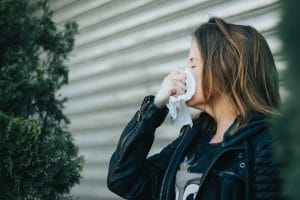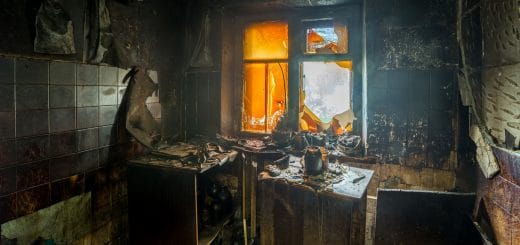How to Prevent Illness After a Disaster
People tend to focus on taking preventative measures before a disaster and often consider the danger has passed once the disaster is over. This is often not the case, as illness quickly spreads throughout the community, even if the disaster itself caused minimal damage. Your chances of becoming sick increase if the temperature is extreme or if your property was affected by floodingFlooding is the overflow or accumulation of water in areas t... More or moldMold is a type of fungus that grows in damp or humid conditi... More.
It is critical that you keep yourself safe from illness after a disaster strikes and you can learn how with these helpful tips.
Animal and Insect-Related Hazards
Disasters can make your home temporarily uninhabitable and if this is the case, your own pets may have to be outside for a bit. Keep your pets on a leash or in a carrier while they are outside, so they don’t run off and bring back diseases. If you encounter a dead or sick stray animal, do not attempt to capture or care for it on your own. Call the local authorities to handle the situation.
Stray animals and insects often seek shelter or adapt to their changing environment during natural disasters, especially floodingFlooding is the overflow or accumulation of water in areas t... More and hurricanes. This brings wildlife closer to people and increases the risk of animals spreading diseases like leptospirosis and rabies. Do not interact with stray or wild animals to avoid contracting their illnesses and do not let your pets interact with them for the same reason.
Carbon Monoxide Poisoning
Carbon monoxide (CO) is a dangerous gas that can cause serious illness and even death if you breathe it in. CO is impossible to detect without the proper equipment because it is colorless and odorless so be sure your CO detector is always plugged in and working. Natural disasters sometimes disrupt the gas lines on your property, and this releases carbon monoxide.
If you suspect your gas lines have been disrupted, do not use a gas oven or furnace because these devices could add more carbon dioxide to the air. Do not use generators, grills, and other propane, gasoline, or gas-burning devices inside or near your home. If you need to prepare food or adjust the temperature in your home, don’t risk messing with your appliances. Instead, look to family, friends, or a community shelter for help.
If your CO detector goes off during or right after a disaster, leave your residence immediately and call 9-1-1. If you feel light-headed, dizzy, or nauseated and suspect you may have CO poisoning, seek immediate medical attention.
Flood Diseases
Flooding disrupts the environment it invades because it brings waterborne illnesses that disturb the natural ecosystem. Bacteria and virusesViruses are microscopic infectious agents that can only repr... More can easily be contracted by people who encounter floodwater and cause illness. If your property has been affected by flood damage, dry and disinfect the building and all items inside to prevent disease.

Contacting moldMold is a type of fungus that grows in damp or humid conditi... More sporesSpores are microscopic reproductive units of fungi or mold t... More on a daily baisis can leadLead is a heavy metal that can be toxic to humans, especiall... More to breathing issues or allergies.
Food and Water
During a disaster, the electricity and water lines may be disrupted and taint the water. Be cautious of food and water during and after an emergency because it may not be safe for consumption. Tainted water can be contaminated with microorganisms, chemicals, and sewageSewage is wastewater containing biological and chemical cont... More waste, which makes it unsafe for drinking, cooking, and bathing. These substances are all hazardous and can cause serious illness or death.
Listen to public announcements about the disaster to find out when it is safe to drink water or use it for bathing or cooking. In the meantime, use bottled water or boil water in order to disinfect it. Avoid opening the fridge if the power is out and do not eat any spoiled food.
Wash Your Hands
Illness and disease can easily spread when your hands encounter harmful agents during a disaster. Be sure to wash your hands after using the bathroom or cleaning up sewageSewage is wastewater containing biological and chemical cont... More, floodwater, or other damage. Use soap and warm, disinfected water to best wash the germs off your hands. Disinfect your water source by mixing it with bleach and letting it sit for half an hour. If you are unable to access clean water or properly disinfect tainted water, use hand sanitizer as a substitute.
Sewage Illnesses
SewageSewage is wastewater containing biological and chemical cont... More is considered a toxic biohazard because it contains fecal matter and industrial waste. Water from a hurricane or flood may be infected with these hazardous materials from overflowing sewageSewage is wastewater containing biological and chemical cont... More systems. If sewageSewage is wastewater containing biological and chemical cont... More has contaminated your property, wear waterproof gloves and rubber boots to be safe during cleanup. Keep open cuts or sores covered during cleanup and wash them with soap and warm water afterward. People with weak immune systems, such as young children, the elderly, and people with cancer, should not participate in the cleanup.
Remove contaminated household materials that cannot be disinfected like rugs, wall coverings, and drywall. Baby toys and stuffed animals also cannot be disinfected and should be thrown away. Wash clothing contaminated by sewageSewage is wastewater containing biological and chemical cont... More or floodwater in detergent and hot water. Keep the infected clothes away from uncontaminated clothes during the washing process.
Injury
Minor injuries and wounds can often be cleaned with soap and warm, uncontaminated water, but this is not the case with major injuries. Seek medical attention immediately if:
- Your wound swells, drains, or becomes red
- You are bitten by a stray animal
- Hazardous materials encounter your eyes or skin
- You receive a puncture wound
- Your wound is infected with saliva or feces
Contact Us
A natural disaster is already a difficult situation without also worrying about the aftermath and its effects. Call a disaster restoration company to properly clean and restore your property so you can worry about the health and safety of you and your family. We will work diligently to return your property to its original condition as soon as possible.












